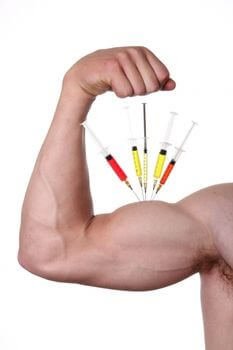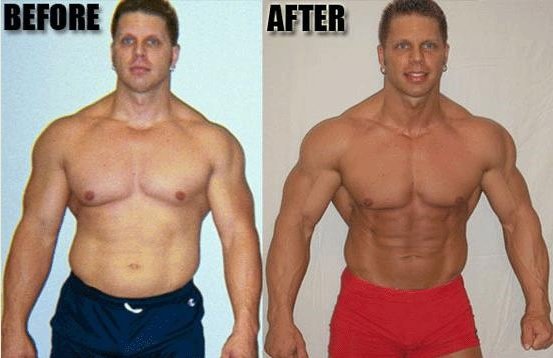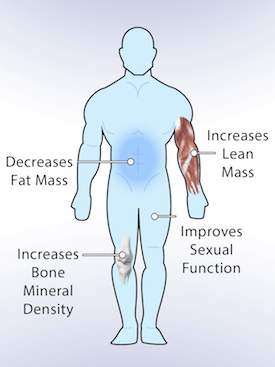Testosterone Replacement Therapy
What is testosterone replacement therapy?
Testosterone replacement therapy is used for replacing the lack of body’s own testosterone with synthetic drugs. Testosterone therapy can completely replace the natural testosterone and cure the symptoms of low hormone levels. Testosterone replacement therapy is usually available in oral, intravenous, intramuscular or patch forms [1].

What is Testosterone ?
Testosterone is the male sex hormone that is found in both males and female (in significantly lower levels). In men, testosterone is important for sexual and reproductive development.
The levels of testosterone vary depending on the age. Testosterone is produced mainly by testes, but adrenal glands also produce a small amount. Hormone’s production is initialized by the hypothalamus that instructs the pituitary gland to control how much testosterone is produced. Subsequently, testes produce the necessary amount of testosterone.
Testosterone is responsible for several functions:
- Antenatal development of male sex organs
- Development of secondary sexual characteristics at puberty
- Deepening of voice
- Increase of penis and testis size
- Hair growth on body and face
- Sex drive
- Sperm production
- Fat distribution
- Red cell production
- Maintenance of muscle strength and mass
- Prevention of osteoporosis [2]
Causes of low testosterone levels
There are two main causes for low levels of testosterone- primary hypogonadisms and secondary hypogonadism.
Primary hypogonadism means that testosterone can’t be produced due to underactive testes. This can be caused by inherited conditions or acquired condition. These conditions include:
- Undescended testes
- Klinefelte’s syndrome
- Hemochromatosis
- Physical injury to the testicles
- Mumps orchitis
- Cancer treatment
Secondary hypogonadism is caused by damage to the brain system that controls the production of testosterone in testes- pituitary gland or hypothalamus. Conditions that can cause this include:
- Pituitary disorders caused by drugs, tumors or kidney failure
- Kallmann syndrome
- Inflammatory diseases- tuberculosis, sarcoidosis and others.
- HIV/AIDS
Secondary hypogonadism can also be caused by:
- Normal aging
- Obesity
- Medications, like opioids and steroids
- Concomitant conditions that might cause severe emotional stress and cause reproductive system to shut down [3].
Symptoms of low testosterone
Low testosterone levels can cause a variety of symptoms that differ depending on the age. Low levels of this androgen during fetal development can cause development of female genitalia or ambiguous genitalia or underdeveloped male genitals.
If there is a lack of testosterone during puberty, the symptoms are usually connected with development of secondary sexual characteristic. Commonly seen signs are:
- Problems with muscle development
- Voice is not deepening
- Lack of body hair
- Underdeveloped genitals
- Overly long limbs
- Gynecomastia- enlarged breasts
- During adulthood, the most common symptoms are:
- Low energy
- Low muscle mass
- Erectile dysfunction
- Infertility
- Decreased sex drive
- Hair loss and slow hair growth
- Gynecomastia
- Insomnia
- Fatigue
- Difficulty concentrating
- Depression
- Low self-esteem
- Irritability [3,4]
Testosterone therapy
Before and after
Testosterone therapy may offer a wide range of benefits for men suffering from hypogonadism. However, scientists still debate on what constitutes as low testosterone. The normal level of his hormone is around 900 ng/dL. American Endocrine Society currently recommends the use of testosterone therapy for men, whose testosterone levels in the blood are lower than 300 ng/dl and who are symptomatic.

Contraindications for testosterone replacement therapy for men are:
- Prostate or breast cancer
- A nodule on the prostate
- PSA levels greater than 2ng/ml
- Hematocrit levels greater than 50%
- Untreated obstructive sleep apnea
- Severe symptoms of lower urinary tract impairment
- Class III or IV heart failure [5]
Testosterone therapy can be the source for many positive effects:

- Improving state of metabolic syndrome-reduce waist circumference, total cholesterol, LDL cholesterol and BMI, as well as increase the “good” cholesterol.
- Beneficial in treating osteoporosis
- Improving sexual function
- Increase muscle mass (but not always strength)
- Improve cognitive function
- Reduce emotional effects of low testosterone
- Increase energy [5,6]
Costs
Testosterone replacement therapy costs depends on the source of synthetic testosterone. There are various available sources of testosterone, like injections, pallets, tablets gels and creams. Average costs of treatments, depending on the dosage and frequency of therapy are:
- Injections- $40 – $200 per month
- Pallets- from $500
- Oral tablets $100 to $300 for a pallet
- Gels and creams: $200 to $500 a month
- Gum and cheek sources $200 to $500 a month.
Beside the costs on the source of synthetic testosterone, costs also include doctor’s visits, analyses to determine levels of testosterone and additional investigations, to determine general health status and possible contraindications for therapy. You can see the prices at this source.
Side effects
There are risks to using testosterone replacement therapy. These side effects include:
- Worsening of sleep apnea
- Development of acne or other skin reactions
- Stimulate development of benign prostatic hyperplasia
- Stimulate growth of existing prostate cancer
- Enlargement of breasts
- Limit sperm production or cause testes to shrink
- Increase risk of blood clot forming and deep vein thrombosis
- Increase risk of heart disease [5]
References
- What is TRT: http://www.medicinenet.com/script/main/art.asp?articlekey=11318
- Testosterone: http://www.livescience.com/38963-testosterone.html
- Causes of low testosterone: http://www.healthline.com/health/low-testosterone-causes#Causes3
- Symptoms: http://www.webmd.com/men/guide/testosterone-replacement-therapy-is-it-right-for-you#1
- Risk factors and side effects: http://www.harvardprostateknowledge.org/a-harvard-expert-shares-his-thoughts-on-testosterone-replacement-therapy
- Therapy effects: http://www.endocrine.org/news-room/press-release-archives/2008/testosteronereplacementbenefitsoldermenwithlowtestosterone
- Costs: http://www.scottsdalehealthcenter.com/how-much-does-testosterone-cost.html
